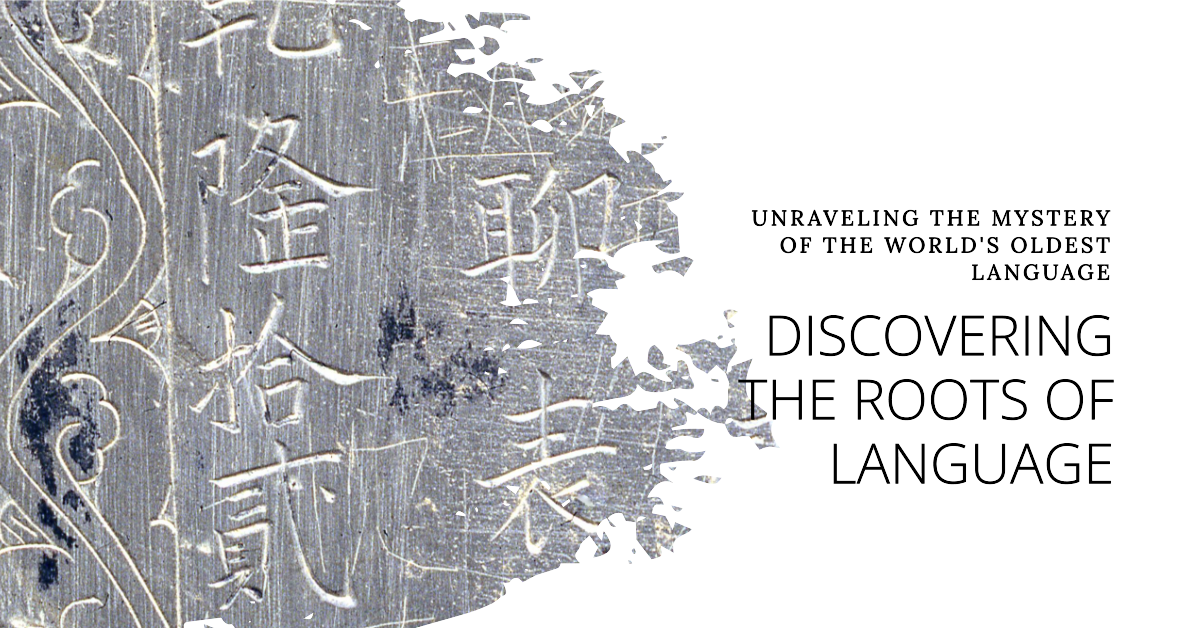Unveiling the Ancient Tongues: Quest for the World's Oldest Language
Embark on a captivating journey as we delve deep into the enigmatic realms of linguistic history. In this blog, we unravel the mysteries surrounding the world's oldest language, tracing its roots through time and exploring the incredible evolution of human communication.

From the primal grunts of our distant ancestors to the intricate languages that shape our modern world, the evolution of human communication is a remarkable saga. At the heart of this narrative lies the quest for the world's oldest language – a linguistic treasure trove that holds the key to our shared human heritage. In this exploration, we'll venture through the annals of time to uncover the origins of language, piecing together the puzzle of our ancient tongues.
Tracing the Threads of Antiquity
The trail of ancient languages is like a tapestry woven through millennia, each thread representing a fragment of human expression. Archaeologists and linguists, armed with an insatiable curiosity, have embarked on expeditions across continents to decipher ancient scripts and inscriptions. From the cuneiform writings of Mesopotamia to the hieroglyphs of Egypt, these linguistic detectives meticulously piece together the mosaic of our linguistic ancestry.
Unlocking the Rosetta Stone
One pivotal moment in this linguistic journey was the discovery of the Rosetta Stone in 1799. This slab of stone, inscribed with a decree issued at Memphis in 196 BC, proved to be a linguistic Rosetta key. The same text was inscribed in three scripts: Ancient Egyptian hieroglyphs, Demotic script, and Ancient Greek. This discovery allowed scholars to decipher the hieroglyphs, opening a door to the ancient Egyptian language and culture.
Theories and Speculations
Unraveling the world's oldest language requires a blend of scientific rigor and imaginative speculation. Linguists and anthropologists have proposed various theories regarding the origin of language. The "Bow-Wow" theory suggests that language originated from imitating natural sounds, while the "Pooh-Pooh" theory proposes that it developed from instinctive cries and exclamations. The "Yo-He-Ho" theory posits that language emerged from coordinated efforts during activities like hunting. While these theories offer insights, the true genesis of language remains shrouded in mystery.
The Role of Evolution
As we probe deeper into the quest for the world's oldest language, it's essential to consider the role of evolution. Our capacity for language is intricately linked to the development of the human brain. The Neanderthals, our ancient relatives, also displayed signs of communication, but the complexity and depth of human language set us apart. The gradual expansion of the human brain's cognitive capabilities likely played a pivotal role in the evolution of language.
The Cultural Imprint
Languages are not mere tools of communication; they are mirrors reflecting the cultures that birthed them. The world's oldest language, whichever it may be, holds within its words and structure a glimpse into the beliefs, stories, and daily lives of our ancestors. The linguistic relics they left behind serve as time capsules, allowing us to connect with their world across the ages.
Piecing Together the Puzzle
While we may never definitively pinpoint the world's oldest language, the quest to do so remains an integral part of our intellectual and historical curiosity. As scholars dig deeper and technological advancements aid in deciphering ancient scripts, we uncover new layers of our linguistic heritage. The study of ancient languages is a multidisciplinary endeavor that draws insights from archaeology, anthropology, linguistics, and even neuroscience.
Preserving Our Linguistic Legacy
As we explore the ancient tongues that preceded our modern languages, it becomes evident that preserving linguistic diversity is vital. Just as the world's oldest language shaped the course of human history, each language spoken today contributes to our global tapestry. Preserving endangered languages isn't just about linguistics; it's about safeguarding the unique perspectives, cultural nuances, and wisdom held within each language.
Conclusion
The quest for the world's oldest language is a journey that transcends time and borders, inviting us to delve into the very essence of our humanity. As we uncover ancient texts, decipher forgotten scripts, and piece together the puzzle of linguistic history, we gain a renewed appreciation for the power of words to bridge the gaps between epochs. In our ongoing exploration, we celebrate the myriad ways in which language connects us to our past, and present and the boundless potential of our shared linguistic future.










